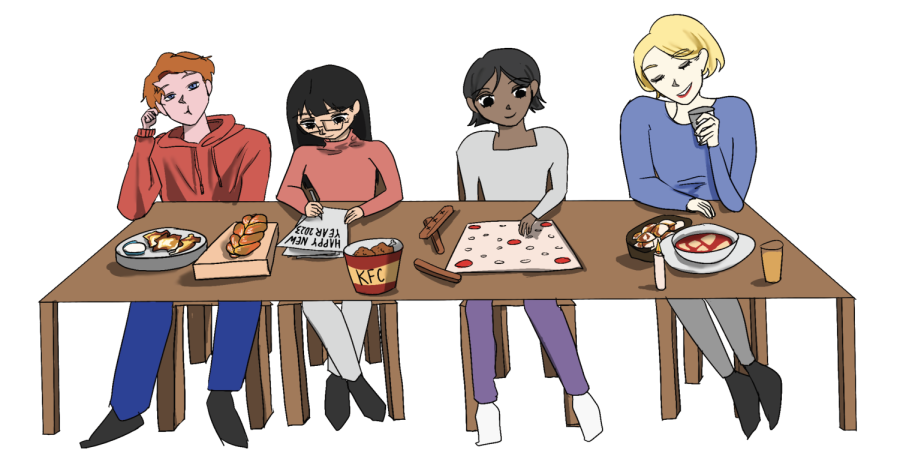Winter holidays bring tradition, spontaneity
December 16, 2022
Whether it is a family meal with traditional food or a visit to a place of worship, holidays hold a special place in many people’s hearts. In cultures around the world, winter holidays such as Hannukah, New Year’s, Christmas, and Lunar New Year come with a variety of different traditions.
In Japanese Club, New Year’s celebrations consist of making homemade mochi, a rice cake, and creating Nengajo, New Year’s greeting cards similar to Christmas cards, senior Lizzy Nakashima, Japanese Club Vice President, explained.
“A lot of Japanese people have mochi and we even [went] to the Foods room to make traditional mochi,” Nakashima said. “A lot of people think it’s only supposed to be sweet, but you can also have it savory.”
From going to Kentucky Fried Chicken on New Year’s to eating tempura, which are a type of fried vegetables, Nakashima’s Japanese holiday celebrations do not stop in the classroom. In previous years, Nakashima spent the holidays in Japan visiting Shinto temples and celebrating the luck that new beginnings represents in Japanese culture.
“When you ring the bell, you’re saying goodbye to the past year and you’re ready for the new one,” Nakashima said. “This is an old Shinto [phrase] that my grandfather used to say, where you have to ring [the bell] super hard so you can wake up the gods.”
Hanukkah is an eight-day wintertime “festival of lights”, celebrated with a nightly menorah lighting, special prayers, and fried foods, according to Chabad.org. For sophomore Daniel Kornfeld, Hanukkah is a time for family to prepare and eat traditional Jewish foods, such as latkes, a potato pancake, and challah, a braided Jewish bread. Additionally, the Kornfeld family’s New Year’s celebrations include the Russian tradition of a decorated tree and presents.
“My parents [came] from the USSR, and there was a Russian tradition to have a New Year’s tree,” Kornfeld said. “We’ll have a Christmas tree, but it is a New Year’s tree. It is kind of funny.”
Lunar New Year, celebrated among East Asian countries, is a very important holiday in the Lunar calendar, which is based on cycles of the moon, junior Yoon Oh, Korean American Student Association (KASA) Co-leader, explained. She explained that Lunar New Year is a time for families to get together and wish for a “lucky” rest of the year.
“It is custom to express filial piety by bowing to one’s parents on Lunar New Year’s, so for my family, we use this holiday to show gratitude,” Oh said. “This tradition displays the parent-to-child relationship that Koreans are suggested to maintain.”
Oh recalled that in past years, KASA celebrated Lunar New Year by playing Yut Nori, a traditional Korean board game.
“Yut Nori is a traditional Korean board game where we throw wooden sticks and move [our] chips based on how many [sticks we] flip,” Oh said.
For Natalia Szczur, Polish Club Sponsor and Social Studies Teacher, her Christmas celebrations include the traditional Polish Christmas Eve dinner called “Wigilia”, a meal consisting of 12 different dishes. At this meal, it is traditional to set an extra seat at the table for those who could not be there or those who might walk in and need a meal, Szczur explained.
“We start the meal by breaking an oplatek, a very thin wafer,” Szczur said. “[We] break this wafer, [pass it] to everybody, and break a part of their [wafer piece]. They break a part of yours, exchange wishes, and then you eat each other’s [pieces] to signify those wishes.”
Polish Club has done their own iteration of Wigilia in the past, but potluck style, Szczur explained. She elaborated that members of the club signed up to bring various traditional Polish dishes and celebrate Christmas together, though last year’s celebrations ended a bit differently than typical years.
“Last year we intended to go to a local restaurant [to celebrate], but the restaurant closed down,” Szczur said. “We ended up just going to Culver’s. It was definitely not traditional, but we still had a meal and [spent] time together. This year we are hoping to go back to the potluck meal [and] more traditional [celebrations].”



